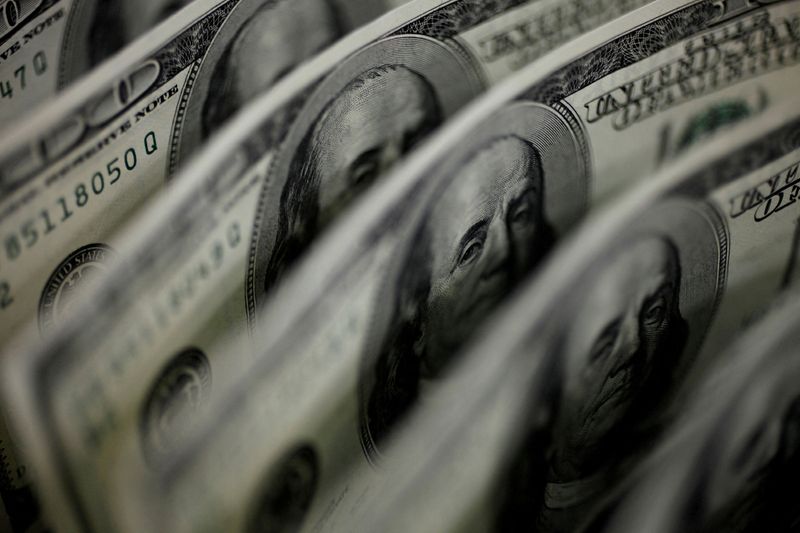(Reuters) - The dollar's 12% year-to-date rise has raised global concern, and will surely be debated when G20 policymakers meet on July 15-16. All the more so, if it vaults to parity against the euro for the first time in 20 years.
British politics, Chinese lockdowns, U.S. banks' results and central bank hawks also bear watching.
Here is your look at the week ahead in markets from Dhara Ranasinghe, Tommy Wilkes and Sujata Rao in London, Jamie McGeever in Orlando and Kevin Buckland in Tokyo.
1/ DOLLAR, WE BOW TO YOU
Europe's single currency is the dollar's latest victim. Now at 20-year lows around $1.014, it could soon eyeball parity, hit by the dollar's broad safe-haven appeal but also by surging gas prices that have fanned recession risks in the euro area.
Wednesday's data, expected to show headline U.S. inflation rising 8.7% year-on-year in June versus May's 8.6%, could cement bets on another hefty Federal Reserve rate hike and lift the dollar further.
G20 finance ministers and central bankers, meeting July 15-16 in Bali, are watching. Tightening financial conditions have cratered markets, and with the dollar so strong, a kind of 'reverse currency war' is under way, where countries prefer stronger exchange rates to dampen inflation.
Euro/dollar heading towards parity? https://fingfx.thomsonreuters.com/gfx/mkt/egpbkgzoevq/euro0707.PNG
US financial conditions https://fingfx.thomsonreuters.com/gfx/mkt/egpbkgredvq/Pasted%20image%201657141636405.png
2/ WEST(MINSTER) WING
The resignation of Britain's scandal-ridden Prime Minister Boris Johnson, means the world's fifth-biggest economy is further adrift just as sterling hovers near two-year lows and Britons endure the worst cost-of-living squeeze in decades.
But if the Westminster drama is dominating TV screens, markets have sat quietly watching from the sidelines. That may change once the new government's priorities become clear.
Nadhim Zahawi, appointed finance minister just days ago, may review some tax hike plans and could cut others. But while loosening the purse strings may support sterling, it could inflame inflation, already seen heading past 11%.
May GDP numbers on Wednesday will likely reinforce the growth gloom but don't discount the potential for the Westminster chaos to hit markets.
UK GDP https://fingfx.thomsonreuters.com/gfx/mkt/lbvgnxkyxpq/Pasted%20image%201657140705736.png
3/ ON WALL STREET
U.S. banks kick off second-quarter earnings and it's not looking pretty. Yes, higher interest rates are helpful but economic growth is also slowing.
So while Refinitiv I/B/E/S estimates show overall S&P 500 earnings growing an annualised 6% in Q2, financials are expected to rack up a 20% drop in earnings.
Much of that decline stems from worsening outlooks for loan losses, as interest-rate rises increase the risk of borrower defaults. Accounting standards require banks to factor macro-economic views into loss provisions, and thus results.
Fee income could stutter, too, brokerage Wedbush predicts, citing pressure from mortgages and capital markets revenue.
Morgan Stanley (NYSE:MS) and JPMorgan (NYSE:JPM) kick off earnings Thursday, followed by Citi, State Street (NYSE:STT) and Wells Fargo (NYSE:WFC) the next day.
Overall, Q2 results should shed light on the outlook for profit margins, input costs and hiring. And listen out for what company bosses say about a potential recession.
U.S. Q2 earnings growth https://graphics.reuters.com/GLOBAL-MARKETS/THEMES/lbpgnxqjjvq/chart.png
4/ COUNTING THE COVID COST
Weeks after lifting an oppressive two-month lockdown, China is racing to contain a cluster of COVID cases centred on a Shanghai karaoke lounge. With new cases flaring, mass testing and fresh activity curbs have been introduced.
The economic cost of draconian zero-COVID policies will come into relief on Friday, when China releases second-quarter GDP figures.
Economists say the official 5.5% GDP target is out of reach, but President Xi Jinping remains committed to the zero-COVID policies, choosing "temporary" economic costs over endangering lives.
Macau shut all its casinos for the first time in more than two years on Monday, sending shares in gaming firms tumbling as authorities struggle to contain the worst coronavirus outbreak yet in the world's biggest gambling hub.
Investors are concerned. Shanghai stocks have paused their five-week winning streak, while growth fears have sent iron ore to its lowest level for the year.
China GDP https://fingfx.thomsonreuters.com/gfx/mkt/zdvxoeloopx/Pasted%20image%201657181540073.png
5/ HALF-POINT CLUB
When even central banking doves such as Switzerland raise interest rates by half a percent, the Royal Bank of Canada and the Reserve Bank of New Zealand can hardly opt for 25 basis-point moves.
The RBNZ has already raised rates five times straight to 2%. Given it projects rates to double to 4% in the coming year, analysts reckon it will deliver another half-point move on July 13.
The same day, the Bank of Canada could lift rates by 75 bps to 2.25%, having delivered back-to-back 50 bps hikes. That would be its biggest move since 1998.

But watch for hints that rate hikes may slow. New Zealand business confidence is worsening and housing markets are softening. Canada, meanwhile, is assigned a 35% chance of recession over the coming year.
Rate-hike checklist https://graphics.reuters.com/GLOBAL-MARKETS/mypmnremyvr/chart.png